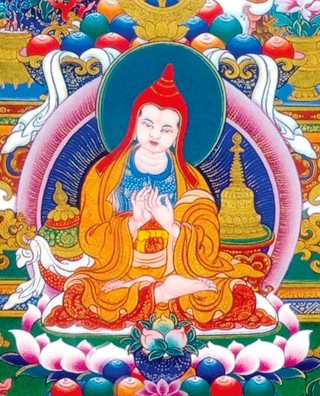Lamp for the Path of Awakening: Difference between revisions
mNo edit summary |
(Tsadra Foundation Tibetan text.) |
||
| Line 10: | Line 10: | ||
{{:Quotations: Atisha, Lamp for the Path to Enlightenment, Intermediates avoid harmful actions}} | {{:Quotations: Atisha, Lamp for the Path to Enlightenment, Intermediates avoid harmful actions}} | ||
{{:Quotations: Atisha, Lamp for the Path to Enlightenment, Supremes long to end the sufferings of others}} | {{:Quotations: Atisha, Lamp for the Path to Enlightenment, Supremes long to end the sufferings of others}} | ||
==External Links== | |||
*[http://library.tsadra.org/index.php/The_Catalog_of_The_Treasury_of_Precious_Instructions Tsadra Foundation] | |||
[[Category:Texts]] | [[Category:Texts]] | ||
[[Category:Kadampa]] | [[Category:Kadampa]] | ||
Revision as of 19:13, 22 March 2017

Lamp for the Path of Awakening (Skt. bodhipathapradīpa; Wyl. byang chub lam sgron) - Atisha's most famous and influential treatise, in which he defined the three levels of spiritual capacity and, in just 68 verses, laid the foundation for the lamrim tradition.
Translations
- Geshe Sonam Rinchen, Atisha's Lamp for the Path to Enlightenment, Snow Lion, 1997
- Ronald M. Davidson, Atiśa's Lamp for the Path to Awakening', in Buddhism in Practice, edited by Donald S. Lopez Jr., Princeton University Press, 1995
Quotations
སྐྱེས་བུ་གསུམ་དུ་ཤེས་པར་བྱ། །
You should know that beings are of three kinds—
Those of lesser, intermediate and supreme capacity.
འཁོར་བའི་བདེ་བ་ཙམ་དག་ལ། །
རང་ཉིད་དོན་དུ་གཉེར་བྱེད་པ། །
Those who strive by any means
To gain only the pleasures of samsara
For themselves alone—
Such people are called 'lesser' individuals.
སྡིག་པའི་ལས་ལས་ལྡོག་བདག་ཉིད། །
གང་ཞིག་རང་ཞི་ཙམ་དོན་གཉེར། །
Those who turn their backs on worldly pleasures,
And avoid any harmful actions,
Striving for peace for themselves alone—
Such individuals are said to be 'intermediate'.
གང་ཞིག་གཞན་གྱི་སྡུག་བསྔལ་ཀུན། །
ཡང་དག་ཟད་པར་ཀུན་ནས་འདོད། །
Those who long to put a complete end
To all the sufferings of others
Through the sufferings of their own experience—
Individuals such as these are supreme.